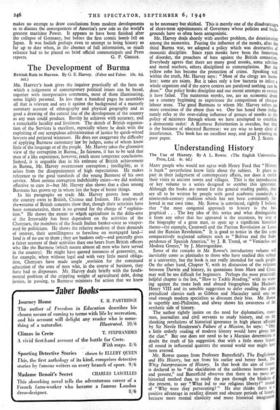The Development of Burma
MR. HARVEY'S book gives the inquirer practically all the facts on which a judgement of contemporary political issues can be based, together with interpretative comments, most of them illuminating, some highly personal. In less than a hundred pages he assembles all that is relevant and sets it against the background of a masterly summary account of ethnography and physical geography and as good a drawing of the central line of the development of the country as any man could produce. Brevity he achieves with accuracy, and a remarkable lucidity and liveliness. The sketch of British organisa- tion of the Services is excellent, especially where he deals with the exploiting of our scrupulous administration of justice by quick-witted lawyers and perjured witnesses. He does not exaggerate the difficulty of applying Burmese customary law by judges, some of whom know little of the language or of the people. Mr. Harvey takes the gloomiest view of the corruption in Burma.„ In fairness, it has to be said. that men of a like experience, however, reach more temperate conclusions. Indeed, it is arguable that in his estimate of British achievement in Burma, Mr. Harvey overstresses corruption ; intelligibly, as it arises from the disappointment of high expectations. He makes reference to the good standards of the young Burmese of his own service. Most serious corruption indubitably exists—we did nothing effective to cure it—but Mr. Harvey also shows that a class among Burmans has grown up in whom lies the hope of better things.
In his paragraphs on trade Mr. Harvey proves how much the country owes to British, Chinese and Indians. His analyses of the returns of British concerns show that, though their activities have been remunerative, there is no ground for the charge of "exploita- tion." He shows • the extent to which agriculture in the delta-area of the Irrawaddy has been dependent on the activities of the Chettyars, the members of the South Indian banker-caste so vituper- ated by politicians. He shows the relative modesty of their demands of interest, their unwillingness to foreclose on mortgaged land- land is of no use to them ; they are bankers only—and generally gives a fairer account of their activities than one hears from British officers who like the Burmese (which means almost all men who have served in the country). He might have quoted instances of generosity, as, for example, when without legal and with very little moral obliga- tion, Chettyars have made ample iirovision for the continued education of the sons of men who, in the course of business, they have had to dispossess. Mr. Harvey deals briefly with the funda- mental problem of the crippling weight of agricultural debt, doing justice, in passing, to Burmese ministers for action that we knew to be necessary but shirked. This is merely one of the disadvantages of short-term appointments of Governors whose policies and back.. grounds have so often been antagonistic.
Mr. Harvey deals shortly with another problem, the deterioration among the monastics. Fearing the influence of the monks, after the
third Burma war, we adopted a policy which was destructive of . monastic discipline. Since 1920 monks have been the fomenten of disorder, the preachers of hate against the British connexion.
Everybody agrees that there are many good monks, some scholars and moral teachers, others disciplined to contemplation. But the yellow robe has become the protection of crime. Speaking well within the truth, Mr. Harvey says : "Most of the clergy are harm. less : -some are saints. But it takes only a few bacteria to infest a whole organism and if the nerve centres are paralysed nothing can be done." Our policy broke discipline and our recent attempts to restore it have failed. The numerous monks, too, are an economic drain on a country beginning to experience the competition of cheaper labour areas. The good Buimans to whom Mr. Harvey refers are more conscious of the abuse than we. One has heard them indig- nantly refer to the over-riding influence of groups of monks in the policy of ministers through whom we have attempted to establish a democratic order': A Burmese Reformation is- overdue, but that is the business of educated Burmese : we are wise to keep clear of interference. The book has an excellent map, and good printing on


























 Previous page
Previous page